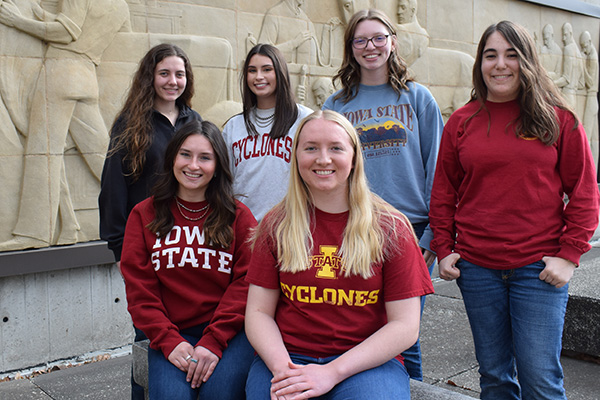
Some plan to work with dairy cattle. Others would prefer swine medicine, while the rest are focused on beef cattle.
Yet each of the six inaugural participants in the Production Animal – Veterinary Early Acceptance Program (PA-VEAP) have some things in common. Each has a strong desire not only to become veterinarians but want to practice in rural America.
Which makes each a good fit in the new, joint program between the College of Veterinary Medicine and the Department of Animal Science. PA-VEAP has been established to recruit and retain future veterinarians to practice production animal medicine, primarily in underserved areas in Iowa and throughout the United States.
“Growing up in a small rural town, I have always experienced a strong community,” said Ashley Carroll, a sophomore animal science major from Elizabeth, Ill. “As a livestock veterinarian, I would be able to feel like I was making a difference in people’s lives.
“Not only would I get to share my love for animals and passion for agriculture, but I would be able to help producers and play an important role in their livelihoods.”
A recent American Veterinary Medical Association study found less than four percent of veterinarians nationwide predominantly practice production animal medicine.
“The declining number of veterinarians supporting the production animal industry poses a significant food security threat,” said Dr. Justin Brown, assistant teaching professor of veterinary diagnostic and production animal medicine and the director of the program. “This shortage also presents an opportunity for students interested in production animal medicine to become a resource for underserved areas.”
PA-VEAP is an undergraduate program for students majoring in animal science or dairy science at Iowa State. Students must also be pursuing completion of an undergraduate certificate in beef cattle, dairy cattle, poultry, or swine production management.
“I decided to be a part of this program because it offers the opportunity to expand my experiences and current knowledge in different aspects of the animal agricultural industry,” said Ashlyn Hammel, a junior from Dorchester, Iowa. “Because the program requires the completion of one of the species management certificates, I will have an amazing opportunity to expand my knowledge about management of businesses and see how producers run their operations. This will give me a different perspective when working with producers as a future veterinarian.”
“My ultimate career goals are to become a mixed animal veterinarian who specializes in beef cattle, as well as to continue operations on my family’s cow-calf operation,” said Grace Pollitt, a junior from Rushville, Ill. “Both of these goals are important to me as they keep the livelihood of my family and hometown community alive and well for future generations ton continue.”
Carroll, Hammel and Pollitt are part of the initial six-person PA-VEAP cohort. The other Iowa State animal science majors in the program include Catherine Collison, Lake City, Iowa; Olivia Stodghill, Oskaloosa, Iowa; and Bailey DuChene, Waterloo, Ill.
The program requires a minimum grade point average of 3.4 while the students complete all prerequisite courses for admission into the College of Veterinary Medicine. Students must also complete a minimum of 300 hours of approved food animal experiences.
“While in PA-VEAP I hope to explore the opportunities of veterinary medicine and network within production animal medicine,” Stodghill said.
Each student will be assigned a faculty mentor in the College of Veterinary Medicine. That was a strong selling point for Stodghill.
“Our mentor will be a great resource we can use whenever we have questions,” she said. “I have already observed that a big part of a veterinarian’s job is not only treating animals but communicating to farmers about their care and helping them improve their flock or herd productivity.
“My job will be to educate the public on disease, treatments and food safety.”
Each initial PA-VEAP participant hopes to return to rural America to accomplish these same goals.
“There are many producers who have supported me throughout my education and I would like to be able to return to those areas and support them the way they supported me,” Hammel said.
April 2024
